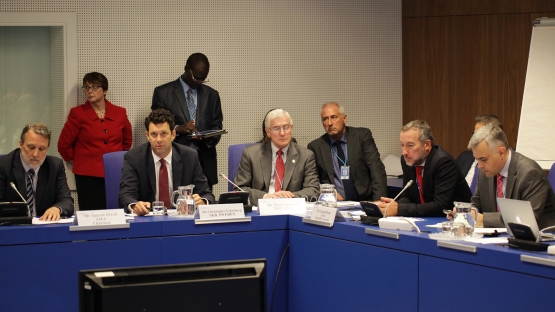The scientific and technical basis for safe geological disposal of high level waste and spent nuclear fuel has been well established in several national programmes, speakers at an IAEA General Conference side event said today.
The challenges of geological disposal place a great responsibility on Radioactive Waste Management Organizations (RWMOs), regulatory bodies and governments, to fully and thoroughly demonstrate that passive safety is ensured for the full time scale lifespan, up to 1 million years, of these repositories. This means that the waste must be safely isolated and contained to protect people and the environment without any further need of active human management.
“Several countries have made substantial progress towards establishing a deep geological repository,” said IAEA Director General Yukiya Amano opening the event. “The first such facilities may become operational within a decade.”
While safe and secure waste management solutions have been in operation around the world, implementing geological disposal of high level waste and spent nuclear fuel has proven to be more challenging than originally anticipated. No countries have fully implemented deep geological disposal facilities to date. RWMOs in the United States, Sweden and Finland have submitted a license application to construct repositories, while the French RWMO is currently preparing its application.
Representatives from the RWMOs in Sweden and France shared their experiences at the event.
Sweden has developed a safe disposal solution for spent nuclear fuel in a crystalline rock formation in the northeast of the country. Christopher Eckerberg, President of the Swedish Nuclear Fuel and Waste Management Company SKB, emphasized that strong public involvement and close cooperation with local municipalities were key to the success of this programme. “We annually measure public acceptance of our proposal for the repository,” he added, “75-80% of people in the community have trust in our company and support our plans.”
France has developed a safe disposal solution for high level waste in a clay formation in the east of the country. Pierre-Marie Abadie, Director General of the French National Radioactive Waste Management Agency (Andra), emphasized how a staged approach helped steer the programme from preliminary research to siting and the current, industrial development phase. “We have a clear development plan that is updated on a regular basis,” he said. “Learning over time has led us to the implementation phase of the geological disposal project.”
The event also included a panel discussion, in which representatives of the US and Finnish regulators joined the experts from Swedish and French implementing organizations.
Finland’s Radiation and Nuclear Safety Authority (STUK) has recommended that the government issue a licence for the construction of a deep geological repository. The US Nuclear Regulatory Commission completed the safety evaluation report for the Yucca Mountain geological repository licence application in January 2015, but further work remains suspended.
We annually measure public acceptance of our proposal for the repository. 75-80% of people in the community have trust in our company and support our plans.


